J. Scott Keech
- 1970
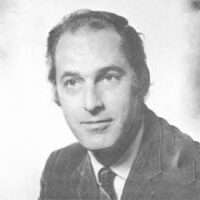
Fellowship Title:
- Minority Groups in the Unided Kingdon
Fellowship Year:
- 1970
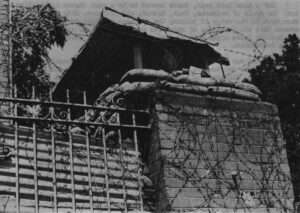
Northern Ireland – Divided Against Itself
It is a time of troubles once again, and for the fourth time in fifty years preventive detention has been imposed in Northern Ireland. The knock on the door that many had long expected began to be heard a couple of hours before dawn on August 9th, By mid-day nearly 300 persons – all men and all but a handful Roman Catholics – were in Custody. Some were freed within 48 hours, and some will sooner or later face ordinary criminal charges before ordinary courts. The rest face internment for an indefinite period. They will be charged with no crime. They will have no right of habeas corpus or trial by jury. They will have no right to see an attorney or any member of their families, no right to send or receive any communication. For they are suspected of acting or having acted or being about to act in a manner prejudicial to the preservation of the peace and the maintenance of order in Northern Ireland. Under the Special Powers Act, anyone so suspected
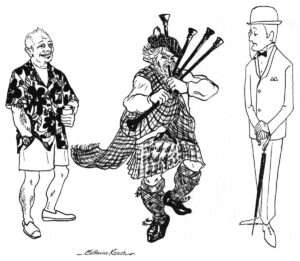
Play Stereotypes
April 7, 1971 fun for the whole family Are you a monopoly Bankrupt? Tired of PARCHESE? Making enemies at DIPLOMACY? play Stereotypes Try OPPOSITE: COMPLETE THE CATALOGUE: The AMERICAN isloud,rich,friendlyHe tells tall tales The ENGLISHMAN isquiet,hard up,aloof.He is given to understatement. I am a WOMAN:ergo I… Gossip Change my mind Drive badly UPDATE CHARADES:Be German tourists: march to the beach and lie in the sun in battalions.Be a French family: form factions even below the tide line. Hundreds of variations! SEND NO MONEY Kindly souls in the United States and in London warned me that the Scottish dialect would be hard to understand. In Huddersfield, a man whose accent and idiom – rural Yorkshire, someone said – repeatedly baffled me, finally laughed and said, “If you think you have trouble understanding me, wait until you hear the Scots.” Near Berwick-upon-Tweed, I was reduced to smiling and chuckling inanely at a gas station attendant who was obviously trying to be friendly, and who was otherwise entirely incomprehensible. A mile or so further on,
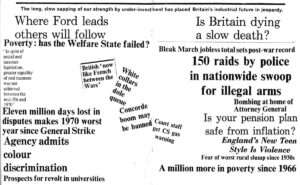
Scotland IV – Old Myths And New Myths
March 25, 1971 Scotland has problems of housing, unemployment and religious bitterness which make it a society torn by class and racial tensions…and the difference between social classes within the same nation may be as great as the differences which divide nations. An anglicized Scot of the upper class is much closer to his English counterpart than to a worker in the Gorbals, and the social composition of the regions and cities of Scotland marks each off from the other as effectively as it marks Scotland off from England. (Modern Scotland, by James Kellas) Some students of nationalism, after adding up the ways that institutions support the concept of a single Scottish nation, and subtracting the sorts of divisions Kellas lists, add a further factor they call “myth”. Kellas says, “There is a Scottish Dream, or Scottish Myth, and it is a part of Scottish national consciousness (or unconsciousness?).” That packs a lot into one sentence, but he clarifies in a footnote what he means by “myth” – “a self-image whose truth or falsehood has
Scotland III – National Identity
Jan. 16, 1971 “No one who has crossed the border from England into Scotland can fail to be aware that in some sense he has come into another country with a life peculiarly its own. He sees around him the symbols of nationality: a flag, a ‘national’ newspaper press and other communications media…a Scottish Football League, a Scottish Youth Hostels Association., a National Trust for Scotland, a Scottish Opera, a Scottish Television, a Scottish Arts Council, and, of course, a Scottish Secretary of State and a Scottish Office.” (Modern Scotland, by James Kellas) “Scotland has possessed all the characteristics of a distinct nation since the twelfth century. Today the Scots have their own national church…education system…legal system…banking system…system of central and local government…way of speaking English – even their own Scottish Trades Union Congress.” (Scottish Nationalism, by H.J. Hanham) Long as these lists are, they are not exhaustive. To them might be added Scottish artists, writers and musicians, Scottish costumes, Scottish banknotes, Scottish sections of the three British political parties, and, of course, a Scottish
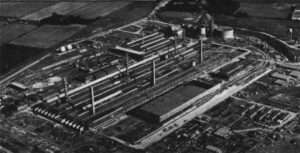
Scotland II – Thinking Big
Jan. 8, 1971 In ancient days, Scylla and Charybis terrorized Ulysses and other mariners in the Strait of Messina, and their home is still something of a menace today. When the Italian government sponsored a design competition for a road and rail link between Sicily and the mainland, entrants had to take account of the strong winds and currents in the Strait, the earthquakes common in the area, and the necessity of leaving space for ships to pass. Most of the entries were more or less ordinary bridges or tunnels, but unusually expensive because of the special conditions. But one entry met all the conditions, and was unusually cheap besides. That one is a “submarine bridge” or “floating tunnel” – two tubes for roads and one for a railway inside a flotation envelope, the whole to be anchored 250 feet under water. The design was submitted by a consortium headed by a Scottish firm. Imaginativeness is something the Scots pride themselves on, and it is not confined to the Highlands (SK3). Among the famous
